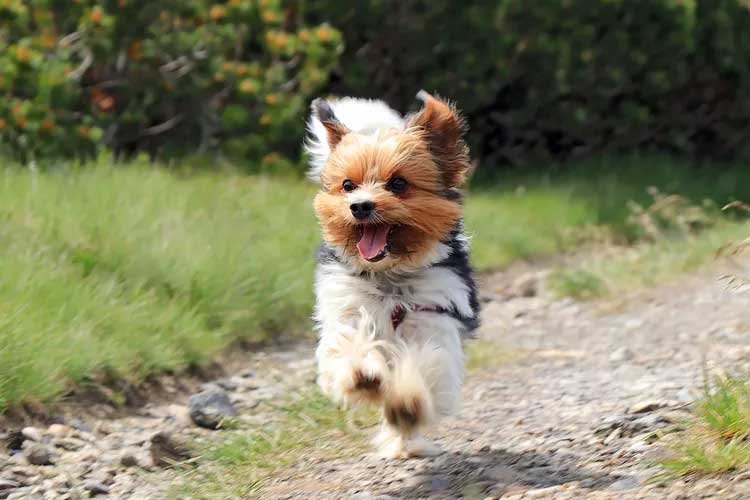Biewer terriers are the new kids on the block. Small, funny, and charming, these members of the toy group will keep you entertained for hours on end. They’re great for first-time dog owners, but be patient when it’s time to find one to bring home.

Biewer Terrier Overview
| OFFICIAL NAME | Biewer Terrier |
| COMMON NAME | Biewer Terrier |
| PET HEIGHT | 7 to 11 inches |
| PET WEIGHT | 4 to 8 pounds |
| LIFESPAN | 16 to 16 years |
| GOOD WITH | cats, children, dogs, families, seniors |
| TEMPERAMENT | friendly, outgoing, willful |
| INTELLIGENCE | high |
| SHEDDING AMOUNT | infrequent |
| EXERCISE NEEDS | medium |
| ENERGY LEVEL | calm |
| VOCAL LEVEL | when necessary |
| DROOL AMOUNT | low |
| BREED GROUP | toy |
| BREED SIZE | small (0-25 lbs.) |
| COAT LENGTH | long, short |
| COLORS | black, blue, gold / yellow, white |
| PATTERNS | tricolor |
| OTHER TRAITS | apartment-friendly, easy to train, good hiking companion, hypoallergenic, requires lots of grooming |
First thing's first. The Biewer terrier, a newer breed that gained American Kennel Club (AKC) recognition in early 2021, is actually pronounced like the semiaquatic rodent: "beaver." But not to worry, these cute little guys and gals should abstain from cutting down your trees.
A direct descendant of the Yorkshire terrier, the Biewer terrier was established in Germany in the mid-1980s. Soon, genetic testing proved that Biewers weren't just a variation of the Yorkie—these pint-sized, happy-go-lucky goofballs are actually their own new breed.
"They get along with anybody, and I just find them to just be the most loving little dogs," says Myrna Torres, co-founder and president of the Biewer Terrier Club of America (BTCA).
There's plenty to like about the Biewer. Gayle Pruett, another club co-founder, says you can skip the TV—simply watching your Biewer terrier will be enough entertainment. They're typically well-behaved, don't shed, and make great travel companions. Need a pup good for a first-time dog owner? This might be the one.
If you sense a big 'ol "BUT" coming, you're right on the money. These are smart, healthy little dogs, but they're also only decades old and already in high demand. That means finding and eventually bringing one home will take time and cost you thousands of dollars. You'll also need to take extra care to avoid puppy mills and other bad actors who might try to sell you an unhealthy dog.
"Take your time. Do your homework. Be patient, and you'll find the right dog," Torres says.
Appearance
As members of the toy group, these are some pretty teensy dogs. According to the breed standard, Biewer terriers will weigh about 4–8 pounds and measure about 7–11 inches tall. As for their colors, you'll find them in tri-color combinations of white, black, blue, tan, and gold.
Yes, they do look like Yorkies and parti Yorkies, which often have gold heads with otherwise white hair and very little black fur. If you're ever confused whether you're seeing a kind of Yorkie or Biewer, look at the tail. A Biewer terrier will have a full tail that plumes over the back, Torres says. Yorkshire terriers won't.
If you're still wondering, Pruett says Biewers have a bit more muscle and sturdier bones than a Yorkie. Their fur also isn't as sparse or thin as a Yorkie's.
You'll generally find Biewer terriers in two coats: the longer, fancier show coat or the shorter, scruffier puppy cut. As you might expect, the longer hairdo will require a bit more brushing and washing. These pups don't have an undercoat, nor do they shed. They're considered hypoallergenic—even though there's really no such thing.
Temperament
Part of the reason the Biewer terrier makes a great match for both experienced and burgeoning dog owners is that these dogs get along with pretty much anybody. Adults, seniors, kiddos, and even cats. Doesn't matter, your Biewer will love them all. (They even do well with the especially young children, but Torres cautions about bigger, older kids who might roughhouse with the small dogs.)"I personally have not run into an unfriendly Biewer terrier," Torres says.

They like to play, play, play when they're at home, whether it's with a toy, a stick, or even a leaf. Your Biewer will show off for you, too, parading around with her favorite toy or a big stick she found outside. She's also prone to cases of the zoomies, so watch where you step if your Biewer is doing her best Tasmanian Devil routine.
Being so small, they're excellent lap dogs who are very attuned to their owner's well-being. They'll jump up into your lap or onto your chest if they sense you aren't feeling too hot and do their best to cheer you up with snuggles.
As for training, Pruett will start training her Biewer terrier puppies when they're around 4–6 weeks old. She says she only needs a little time to teach cues like sit, lay down, and stay. As always, use positive reinforcement methods.
"You start with them real early, and it's like three times you tell them, and they've got it," Pruett says. "They're extremely smart. They learn very quickly."
Living Needs
Your Biewer terrier will be fine living in either an apartment or a house with a fenced-in yard, Torres and Pruett say. They certainly won't say no to a quick dash around the backyard, but a pair of daily walks outside an apartment will be just fine. It's also not a big deal if you miss a day of walks, Torres says. Your terrier is going to get enough exercise playing in the house and following you around.
They also won't say no to chilling in a kiddie pool or going on a short hike. You can even train them to participate in dock diving and agility competitions. Biewers can tolerate hot weather but they certainly don't love it, so make sure they have a place to cool down during the summer. On the flip side, both Torres and Pruett say some Biewers love the snow, romping around in it enough to collect a multitude of tiny snowballs in their fur. Just be cautious that it's not too cold outside for your dog to play safely without being at risk of frostbite or hypothermia.
These dogs love activity, but once they're worn out they're likely to settle down on your lap or in their beds. But they won't stay like that all day long, which is why you need to make sure you're around most of the time or have a companion pet for your Biewer. Otherwise, your terrier might misbehave when left alone.
"These dogs cannot be alone," Pruett says. "They've got to have another dog."
This is also why you should make sure to socialize your Biewer terrier when she's a puppy—after she's vaccinated, of course. That'll give her an easy attitude toward other dogs and humans alike, enhancing her already friendly nature.
Care
Your Biewer terrier grooming regimen will depend on how long you keep her fur, Torres says. The long show coats, with her hair trailing all the way down to the floor, will require daily brushing and twice-monthly baths. The shorter puppy cut will only necessitate brushing every few days and maybe a monthly bath.
But you don't want to wash your dog too often. Pruett warns that frequent baths can dry out your Biewer's skin and cause dandruff. As for other grooming, you'll want to clip your dog's nails whenever you start to hear them click-clack on hard floors. And don't forget about brushing her teeth, either.
Biewer terriers also have dietary needs you'll need to keep in mind—for reasons we're about to explain.
Health
Biewer terriers are healthy dogs, but they do have sensitive gastrointestinal (GI) systems, which affects which kind of food you can feed them, says Pruett, a member of the BTCA's health committee. You'll want to feed your Biewer a low-protein diet with food that includes about 15 percent protein and about 15–30 percent fat. Resist the temptation to feed your Biewer high-fat table scraps like ham or French fries. Too much of that kind of food can lead to pancreatitis, Pruett says.
These pups also suffer from an affliction affecting several small breeds: stubborn baby teeth. Sometimes, a Biewer's puppy teeth won't come out when their adult chompers grow in, Pruett says. That means a trip to a veterinarian to get them removed.
Otherwise, these dogs are (generally) as healthy as you can get, Pruett says. According to the BTCA, breeders should test for at least progressive retinal atrophy and primary lens luxation. In addition, they should secure eye exams from certified optometrists. In general, a Biewer terrier's life span is long, at about 16 years.
History
This breed was quite literally born in 1984, when a Yorkie belonging to Gertrud and Werner Biewer gave birth to a pair of puppies whose black, white, and tan fur didn't at all look like a normal Yorkie's coat, according to the BTCA.Initially called the German Yorkshire terrier, the dog made its public debut in Germany, where the Biewers lived, in 1986. The dogs arrived in the United States in 2003. A little while later, genetic blood tests showed that Biewers had their own genes rather than being a kind of Yorkie.
"This is the first time in the history of dog breeding that a dog has been proven to be a 'purebred' using the tools science has to offer," the BTCA writes. "The Biewer terrier was established as a purebred dog, using science, through the collection of genetic data, instead of the customary pedigree documentation."

The 38-year-old breed—which is kind of crazy considering how some dog breeds' origins can be traced back to ancient times—can now compete in the biggest dog shows as an AKC-recognized breed. However, demand for these pups is already sky high.
"People are flying, literally, from New York to California if there's a dog out there," Pruett says. "Breeders cannot keep up with the [demand] right now."
So many people wanting one means bad actors, including puppy mill operators, might try to take advantage of owners who want a Biewer terrier fast. As two people trying to protect the new breed, Pruett and Torres have some tips on how to spot a phony Biewer terrier breeder:
Average Biewer terrier puppies will cost between $2,000 and $3,000. If they're being sold for less, ask why.
Biewer litters usually consist of only three or four puppies, so it might be a red flag if someone claims to be selling 15–20 dogs.
If breeders have PayPal or credit card buttons on their website, steer clear. Same for those who allow you to pay in installments.
If photos of the available dogs look too good to be true, they probably are.
Don't purchase a "teacup" Biewer terrier. That dog is likely the runt of the litter and could have some serious health problems.
Visit the BTCA's website to start your search for a breeder to make sure they're legitimate.
"Our breed is so young right now and … we're not even able to keep up with demand, so a lot of people are getting impatient so they're going to buy a dog from a puppy mill or a store," Pruett says. "Don't buy a dog from a store. Those dogs come out of puppy mills, and you're buying heartache, basically."
Fun Facts
Remember that first pair of Biewer terrier pups born in Germany? Famous German singer Margot Eskens bought them and added to what was then the breed name: "Biewer Yorkshire Terrier a la Pom Pon." (She added the "a la Pom Pon.")Pruett actually met Gertrud Biewer in 2007. According to the BTCA, Biewer was pleased to hear that her breed was doing well in the states and even signed off on the breed standard.
In 2021, the breed became the 197th recognized by the American Kennel Club.